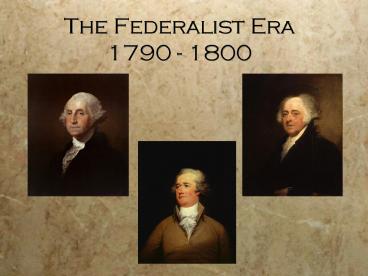The Federalist Era 1790 1800 PowerPoint PPT Presentation
1 / 13
Title: The Federalist Era 1790 1800
1
The Federalist Era1790 - 1800
2
Washingtons Presidency (1789 -1797)
- International Events
- War broke out between England and France in 1793.
- The United States and France had signed a treaty
of alliance in 1778. - Would the United States honor that treaty?
- Washington declares neutrality.
3
Washingtons Presidency (1789 -1797)
- Citizen Genet Affair
- Citizen Genet, the French ambassador to the U.S.,
encourages U.S. merchant ships to mount guns,
become privateers, and attack British merchant
vessels. - Washington orders Genet to stop and Genet ignores
Washington. - Washington orders Genet out of the country, but
he is allowed to stay after he agrees to stop his
activities.
4
Washingtons Presidency (1789 -1797)
- Impressment
- The British were attacking and seizing U.S.
merchant ships and forcing (pressing) American
citizens to join the Royal Navy.
5
Washingtons Presidency (1789 -1797)
- Jays Treaty with England
- In 1794 Washington sends John Jay to England to
make a treaty with the British in order to avoid
a war. - The British agree to
- remove soldiers from western forts.
- let some American merchant ships trade with
British colonies in the Caribbean. - pay for damage done to some American merchant
ships.
6
Washingtons Presidency (1789 -1797)
- Pinckneys Treaty with Spain
- Spain was alarmed by Jays Treaty fearing that
The U.S. and Britain were conspiring to seize
Spains possessions in North America. - Spain agreed to
- allow Americans use of the Mississippi.
- recognize American land claims along the
Louisiana border. - grant Americans the right of deposit in New
Orleans.
7
Washingtons Presidency (1789 -1797)
- Domestic Events
- Whiskey Rebellion (Summer 1794)
- Farmers in western Pennsylvania were upset over a
seven cents a gallon tax on whiskey. - The excise tax was Hamiltons idea.
- Farmers on the Pennsylvania frontier rioted.
- Washington led 12,000 militia from Pennsylvania,
Maryland, and Virginia to put down the uprising.
8
Washingtons Farewell Address
- On Unity (Domestic Affairs)
- The most commanding motive is to preserve the
"union of the whole. - The North, South, East, and West all depend on
each other. - Unity leads to greater strength, resources, and
security.
9
Washingtons Farewell Address
- On Political Parties
- Political Parties.
- creates "animosity of one part against another."
- can lead to "riot and insurrection."
- opens "door to foreign influence and corruption."
10
Washingtons Farewell Address
- On Foreign Relations
- We should exercise "good faith and justice
towards all nations. - "Passionate attachments" will lead us into
"quarrels and wars." - We should not get involved in Europe's affairs.
- "Steer clear of permanent alliances with any
portion of the foreign world."
11
Adams as President (1797 -1801)
- International Events
- The XYZ Affair (1798)
- France was angered by Jays Treaty and began
raiding American shipping. Adams sends diplomats
to France. - Talleyrand, the French Foreign Minister, would
not speak to the Americans until he received a
bribe. - Talleyrand also wants the U.S. to loan France a
large sum of money.
12
Adams as President (1797 -1801)
- The XYZ Affair (1798)
- Adams recalls our diplomats and suspends our
treaty of alliance with France. - This results in an undeclared naval war with
France.
13
Adams as President (1797 -1801)
- Domestic Events
- Americans were outraged by the XYZ Affair.
- The Federalist Congress passed the Alien and
Sedition Acts (1798). - Foreigners are required to live in the U.S. for
14 years before they can become a citizen. - The president could expel from the U.S. any
foreigner suspected of threatening the safety and
security of the U.S. - Americans could be arrested for making critical
statements about the government. - Many Republicans were arrested under this law.

